![]()
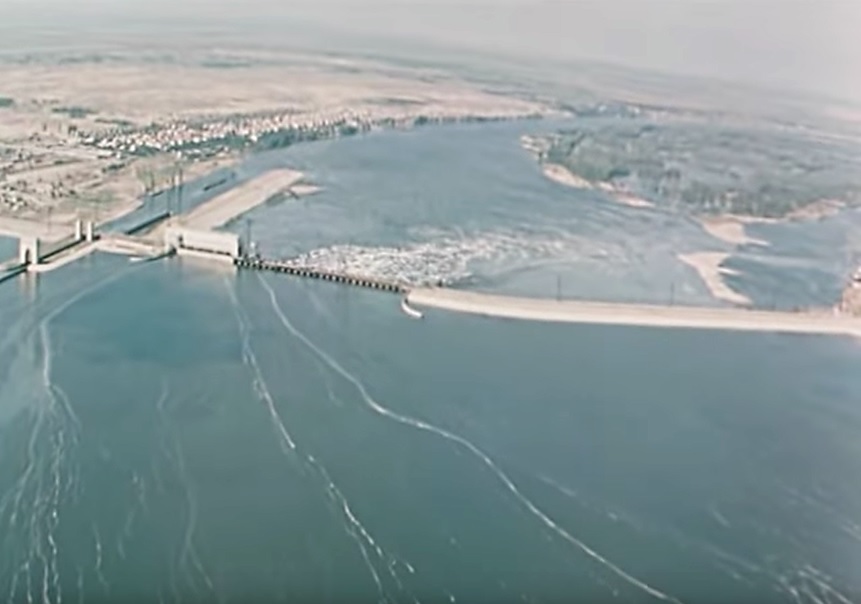
Film 『 Poem of the Sea ( Russian : Поэма о море ) 』
Directed by Yuliya Solntseva ( Russian : Юлия Солнцева )
witten by Alexander Dovzhenko ( Ukrinian : Олександр Довженко )
Release 1958
Starring
Boris Livanov ( Ru : Борис Ливанов ) ( general Ignat Fyodorchenko )
Boris Andreyev ( Ru : Борис Андреев ) ( Savva Zarudny / collective farm chairman )
Zinaida Kirienko ( Ru : Зинаида Кириенко ) ( Katerina / daughter of Savva )
Leonid Tarabarinov ( Ru : Леонид Тарабаринов ) ( Valery Golik / foreman )
Evgeny Agurov ( Ru : Евгений Агуров ) ( Mikhail Petrovich Grekov / scientific engineer )
![]()
〈 Chapter1 〉 Construction and Destruction of the Kakhovka Dam
![]()
〈 a 〉 There was the military incident recently that drew attention to "Poem of the Sea ( 1959 )", which is rarely seen today among Dovzhenko's works, compared to his earlier trilogy of "Zvenigora ( 1928 )", "Arsenal ( 1929 )", and "Earth ( 1930 )". Needless to say, it was the Russian invasion of Ukraine in February 2022 and its continuation, the Russian sabotage of the Kakhovka Dam on the Dnipro River, in June 2023.
![]()
〈 b 〉 Yes, "Poem of the Sea ( 1959 )" is the story of the construction of the now destroyed Kakhovka Dam and the people who participated in it. The film was directed by his wife Yuliya Solntseva from the script by Dovzhenko, who died the day before filming.
![]()
〈 c 〉 However, this film is not a documentary on dam construction. Nor is it a de-capitalist film that condemns the environmental destruction caused by dam construction from today's ecological perspective. Things are exactly the opposite. Reading Dovzhenko's notes, one can understand that he does not consider the construction of dams and hydroelectric power plants to be capitalist development, but considers in earnest them to be the great social project of communism toward the future of humanity, embodied on the global scale. ( *1 )
( *1 ) For example, Dovzhenko says the following.
"The gigantic project of communist construction not only does not exhaust the strength of our people who devote all their life and energy to the construction projects, but on the contrary, it increases them, the great construction projects of communism. Increasing People's Strength, Raising the Spirit and Historical Consciousness."
From 《 Dovzhenko's notes on "Poem of the Sea" 》 ( Translation from Ukrainian into Russian by L. Mikhailov ) published in the Soviet literary magazine "New world ( Новый мир )" issue 4, 1958 p.210
![]()
〈 d 〉 There are a few scenes in this film that seem to be the story of group of people with pastoral atmosphere in the background of dam construction, perhaps due to the fact that Yuliya Solntseva is the director of this film. Andrei Konchalovsky, who saw the film, probably felt the same way and criticized it as being reminiscent of Fellini's "8½ ( 1963 )," but he overlooked Dovzhenko's sympathy for communist society latent in this film ( *2 ). Such ideas of Dovzhenko are already strongly expressed in "Ivan ( 1932 )", which is the prototype for "Poem of the Sea" and depicts the construction of a hydroelectric power plant on the Dnipro River, and from there his attitude has remained unchanged and consistent.
( *2 )
Reading “The Romance of Lovers ( *about the script by Yevgeny Grigoriev )", I recalled Dovzhenko’s brilliant script, “The Poem of the Sea.” Everything in it is fused, mixed, inseparable - what is really happening and what is imagined, what happened once and what can still happen. Many discoveries of Fellini’s “8 1/2” were anticipated here. But Dovzhenko’s main discovery is in people. His heroes stand with their feet on the ground and their heads pointing to the sky.
Возвышающий обман ( in English : Sublime deception ) by Andrei Konchalovsky p.125 Москва : Коллекция «Совершенно секретно» 1999
![]()
〈 e 〉 Ignat Fyodorchenko ( Boris Livanov ), a military man, looked out over the Dnipro River area from the plane on his way home and thought about the many people who live there ( 1~3 ). On returning home, Ignat meets again with Savva ( Boris Andreyev ), his childhood friend and now the collective farm chairman ( 4 ).
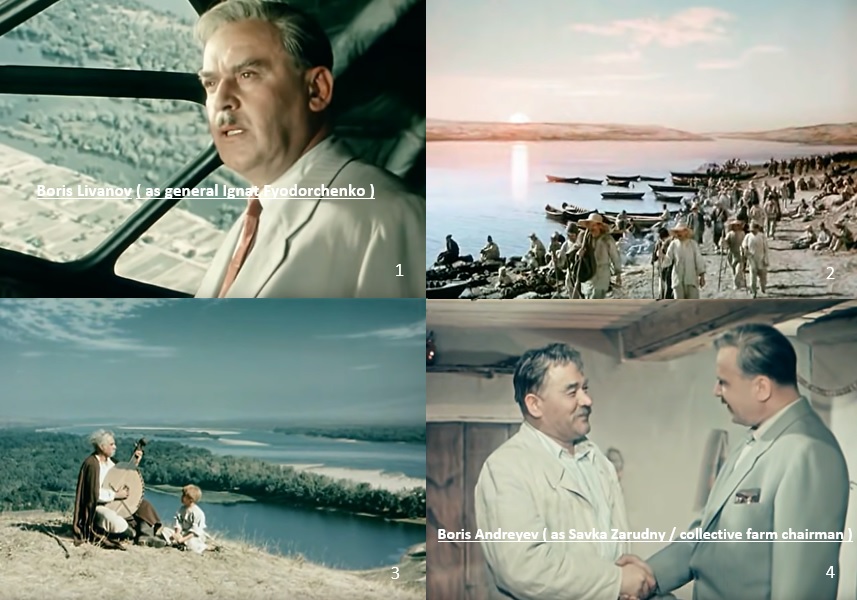
〈 f 〉 Golik drives with Katerina to Kakhovka. Golik hopes to make a career for himself by marrying Katerina, since she is the daughter of Savva, the collective farm chairman ( 5 ). However, Golik was already married to another woman and even had a child. The woman follows Golik and waves at him on the street, but Golik ignores her and passes by ( 6~7 ). Katerina accuses Golik of such behavior, but she does not know that Golik is already married ( 8 ).
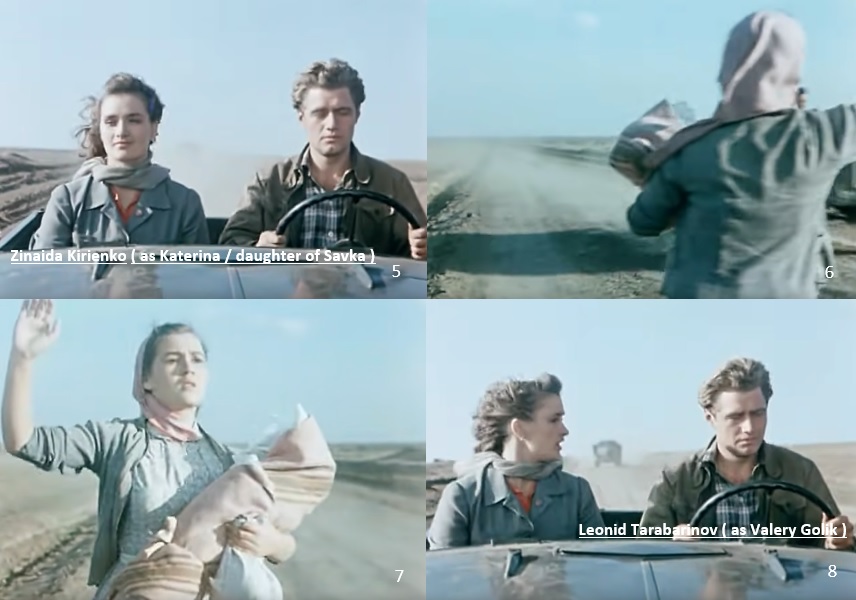
〈 g 〉 Katerina is happy to see her father again ( 9 ). She had previously studied agronomy elsewhere, following her father's profession. However, she returned to her hometown to participate as a scientist in the social project to build the hydroelectric power plant in Kakhovka. Savva is perplexed by her daughter's change of heart, which is not to agriculture but to science, and she is influenced by Golik.
〈 h 〉 The woman in the previous scene ( 6~7 ) who followed Golik to Katerina's house ( 10~11 ). Savka doesn't understand what's going on, and Katerina pretends not to know Golik, but she is still upset inside ( 12 ). Golik does not show up.
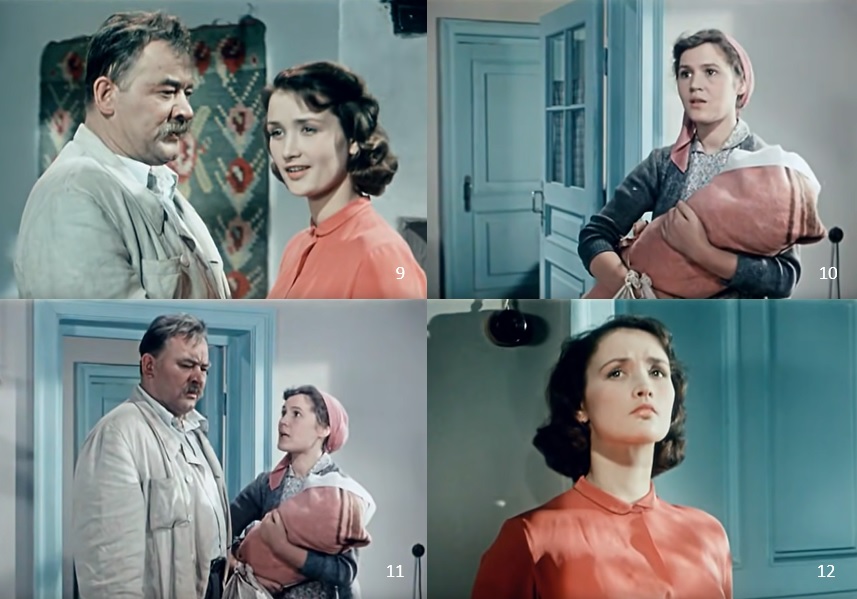
〈 i 〉 Savva explains that the village will sink to the bottom of the lake due to the dam construction ( 13~14 ). Ignat also explains to his family the significance of building the dam for the future of communist society ( 15 ).
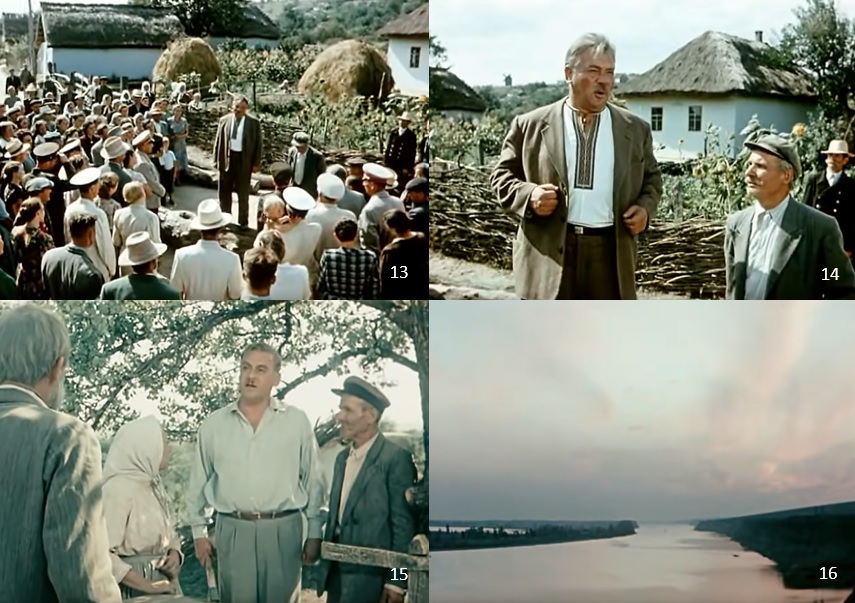
〈 j 〉 Close-up of the bulldozer removing the house in the village ( 17~18 ). Dovzhenko is very interested in bulldozers and writes in his notes that he would like to somehow take this into his poetry, but he cannot do it well himself. As if to indicate that times have changed, perhaps his interest has gone from tractor in "Earth" to bulldozer in "Poem of the Sea". In this case, the heavy machinery of tractors and bulldozers are, for Dovzhenko, the individuals that symbolize communism, and its beginning is Locomotive that the Bolsheviks ride, depicted in "Zvenigora" and "Arsenal".
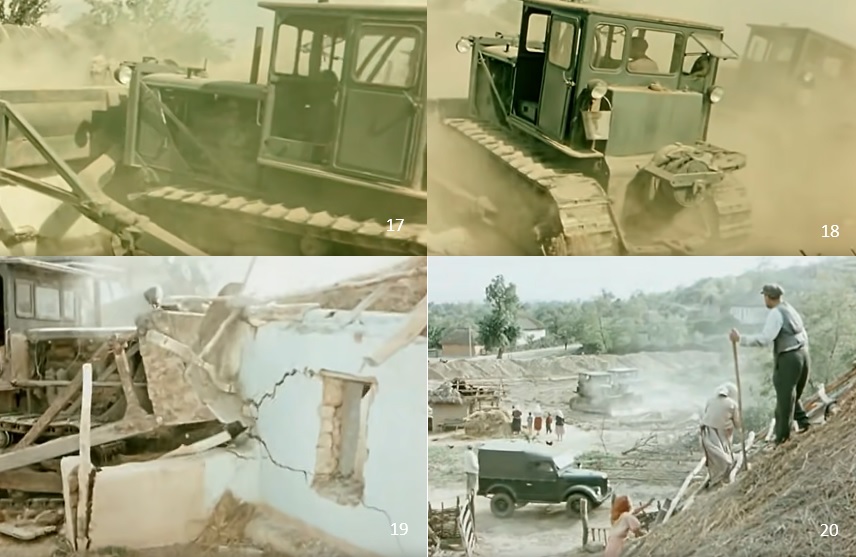
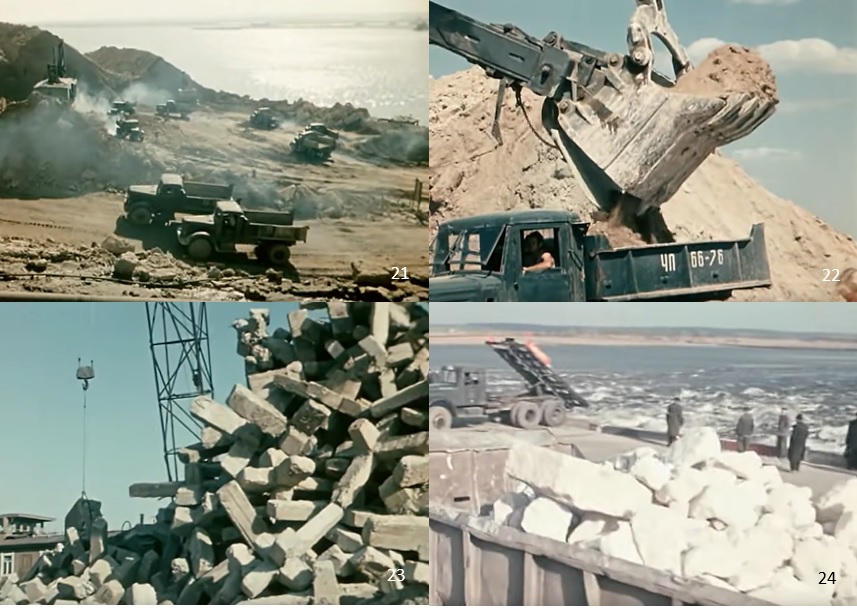
〈 k 〉 Conference on the construction of hydroelectric power plants, chaired by Aristarkhov ( Mikhail Tsaryov ). Because of the portrait of Lenin hanging in the room ( 25 ), it can be inferred that this committee was GOELRO ( Russian : ГОЭЛРО). ГОЭЛРО stands for "Государственная комиссия по электрификациии России ", in other words, "State Commission for Electrification of Russia ", the commission initiated by Lenin to promote the electrification program throughout Russia ( *3 ). However, the construction of numerous reservoirs associated with the construction of hydroelectric power plants, which followed Stalin's "Great Plan for the Transformation of Nature", was unusually excessive in its sheer size. The emergence of artificial oceans, comparable to lakes in the natural world, was not taken into account at all in its disruption of the environmental balance. In his "Letter to the Soviet leaders ( 1974 )", Solzhenitsyn criticizes Soviet industrialization as blindly following the West and ridicules these huge reservoirs as "Inland Seas".
"We have squandered our resources foolishly without so much as a backward glance, sapped our soil, mutilated our vast expanses with idiotic "inland seas" and contaminated belts of wasteland around our industrial centers — but for the moment, at least, far more still remains untainted by us, which we haven't had time to touch. So let us come to our senses in time, let us change our course ! "
《 Letter to the Soviet leaders 》 by Alexandr Isaevich Solzhenitsyn p.26 New York : Harper & Row ( 1974 ) translated from Hilary Sternberg
( *3 ) Refer to Chapter 4 of the following article about this. We can see that Dovzhenko is aware of Lenin.
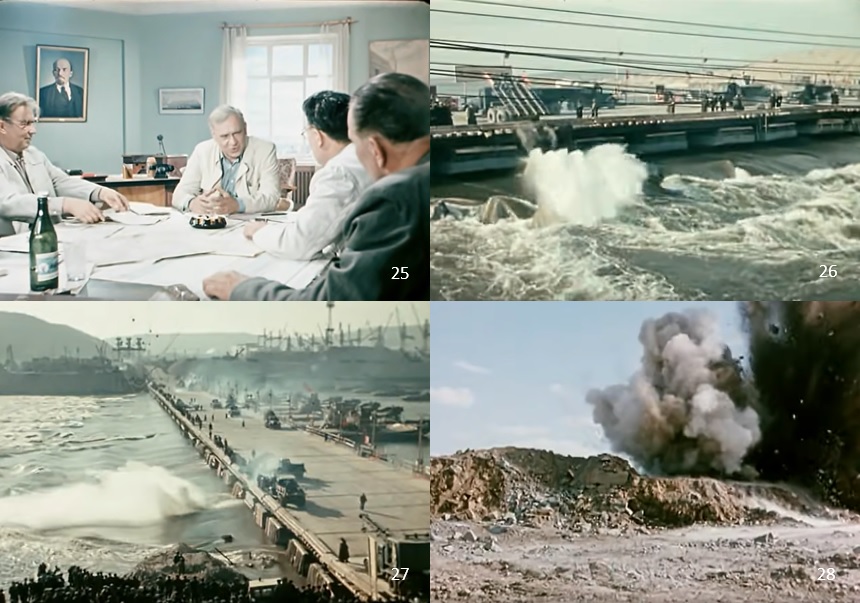
![]()
〈 Chapter2 〉 General Will and the Individual in Dovzhenko
![]()
〈 a 〉 Golik and Katerina are attending a lecture by Grekov, a scientific engineer in the construction of a hydroelectric power plant ( 29~30 ). But Golik is more concerned with himself than the content of the lecture, thinking that marrying Grekov's daughter will further his career. Surprisingly, Golik is considering getting married for the third time ( 31 ).
![]()
〈 b 〉 On the other hand, Katerina is also unable to believe in Golik's humanity, which makes it difficult to concentrate on the lecture ( 32 ). Here again, Golik's first wife comes to Grekov and tells him that Golik is going to marry your daughter ( 33 ). Grekov trembles with anger toward Golik ( 34 ).
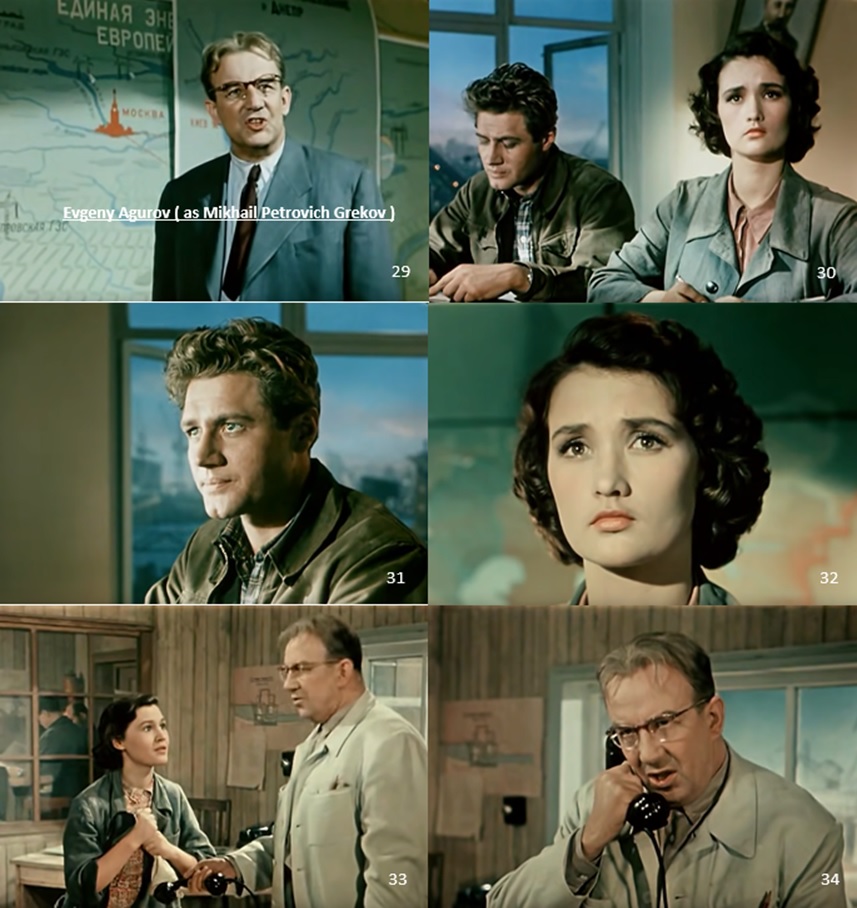
〈 c 〉 Like Grekov, Savva is angry with Golik for cheating on his daughter and punishes him with the whip in his delusion ( 35~40 ).
![]()
〈 d 〉 Considering in here is why Dovzhenko embeds the behavior of Golik, who is trying to get ahead of himself, into the storyline. That is because Dovzhenko's purpose in this work is not to tell the story of the tragicomedy of the inhabitants against the backdrop of the dam's construction, but to portray the solidaristic collectivity of the people, whose tragicomedy is ultimately directed toward the great communist project of building the dam. In other words, Dovzhenko has no qualms about building the dam and fully endorses it as the social project that embodies the communist vision.
![]()
〈 e 〉 Thinking so, we understand that Golik's behavior, which on the surface appears to be portrayed critically as ethically problematic, is not. Golik is being politically criticized as a political dissenter who disturbs General will ( This is the Jean-Jacques Rousseau concept ) of the people's collective to build the dam.
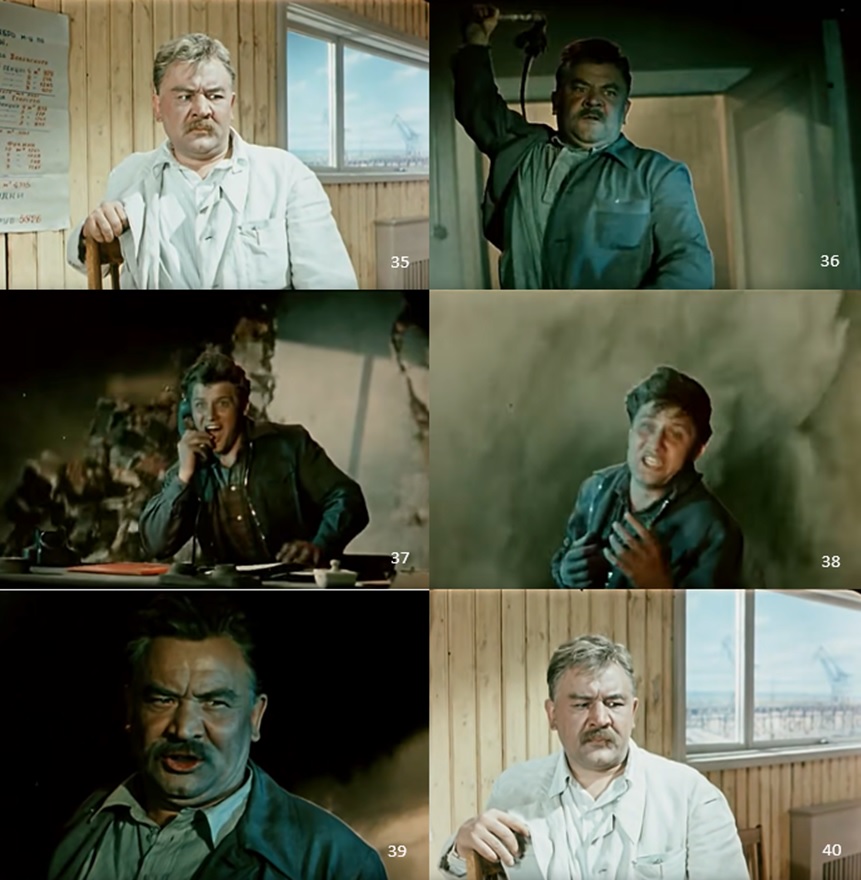
〈 f 〉 Aristarkhov criticizes Golik as a political dissenter ( 41 ). Golik, who has also fallen out of favor with Katerina ( 42~43 ), says he no longer knows who he is ( 44 ). However, the Golik can be considered to be a person who symbolizes the ideological contradiction of Dovzhenko, who has long been fascinated by the idea of the collective people, the foundation of communism, and the cul-de-sac in the real life of Dovzhenko, who came to Moscow to seek help from Stalin to avoid accusations from Ukraine, but was not allowed to return to Ukraine and remained in Moscow.
![]()
〈 g 〉 In other words, here we see Figure of Dovzhenko, who lived his life suspended in the air from the ideology of his origins or geographical affiliation, being neither Ukrainian nor Russian.
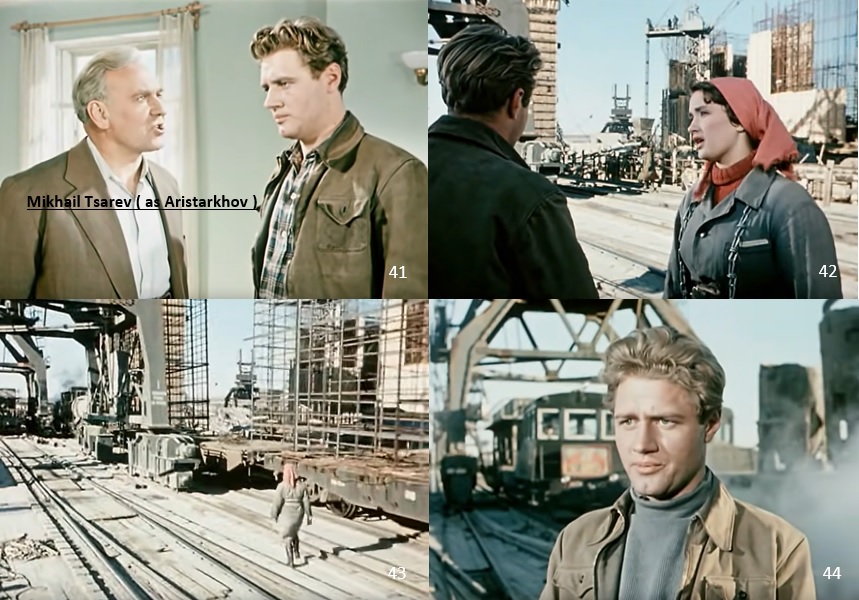
〈 h 〉 People looking out to "sea" ( 45~46 ). Needless to say, the sea here is not the real sea, but the metaphor for the huge reservoirs created by drawing water from the Dnipro River into the plains of Ukraine.
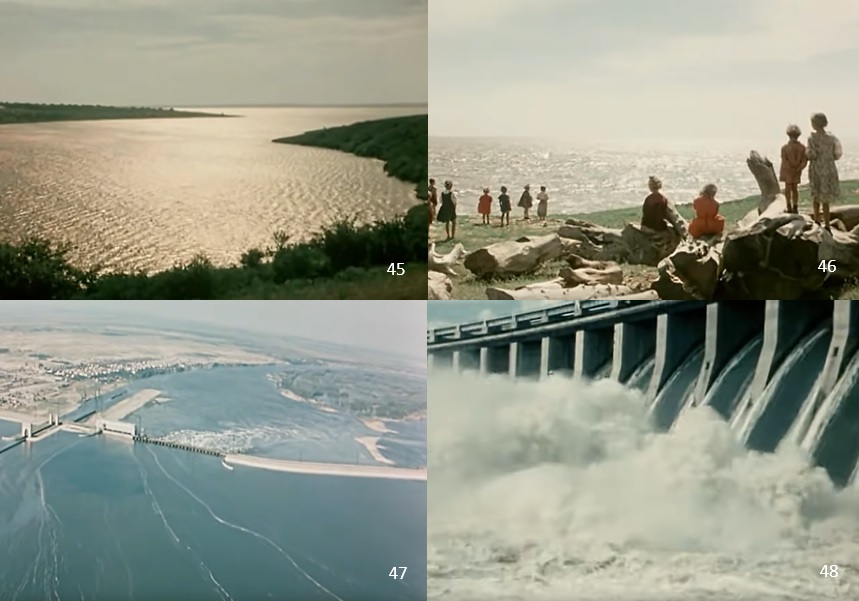
〈 i 〉 A large ship that cruises the populated seas, with GOELRO and the general public on board ( 49~50 ). Among them is Golik ( 51 ), who was supposed to be treated as an political dissenter. This last depicts the final solidary unity of the people, the thought that Dovzhenko continued to hold.
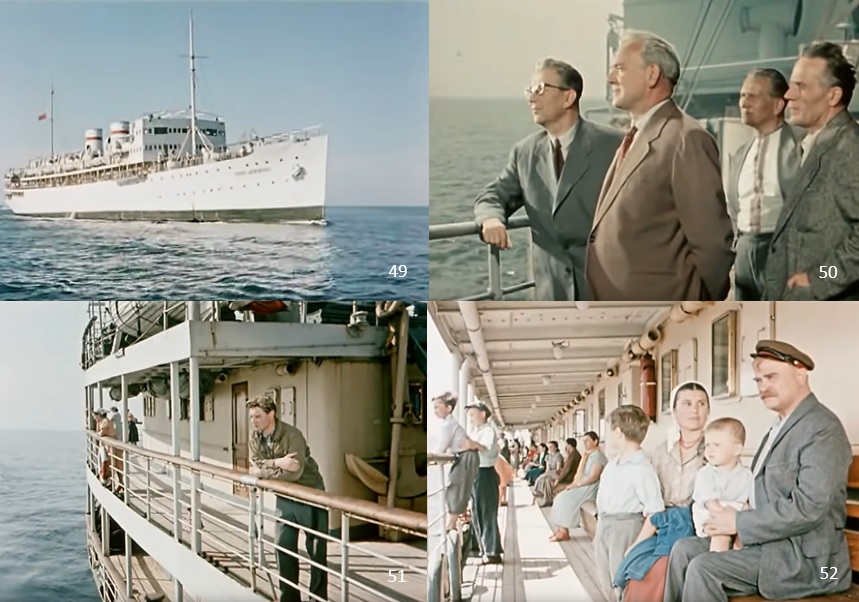
![]()
〈 END 〉
![]()